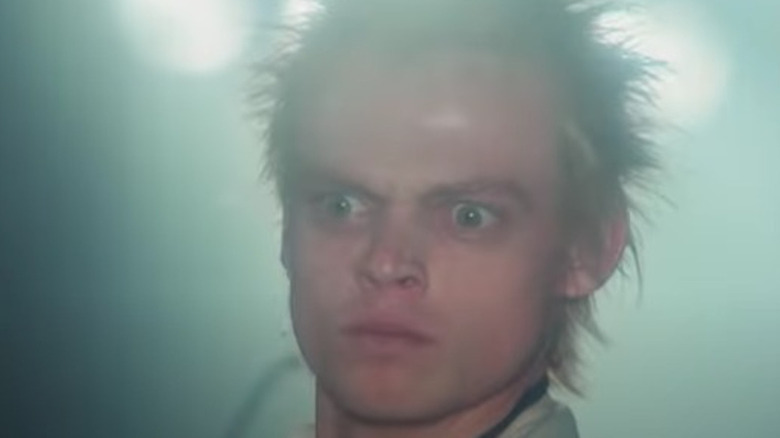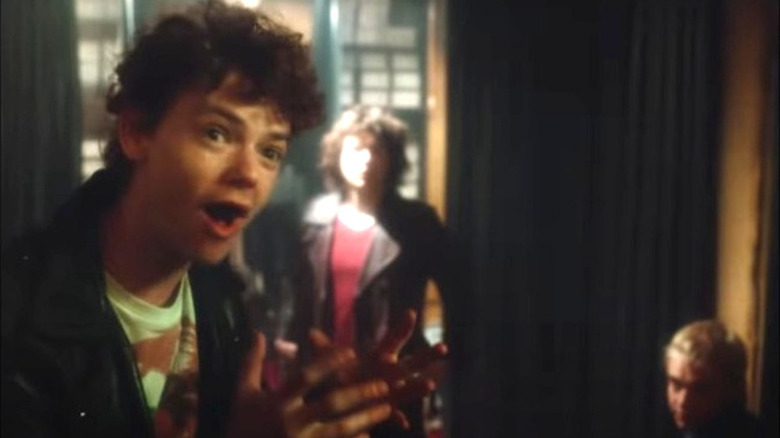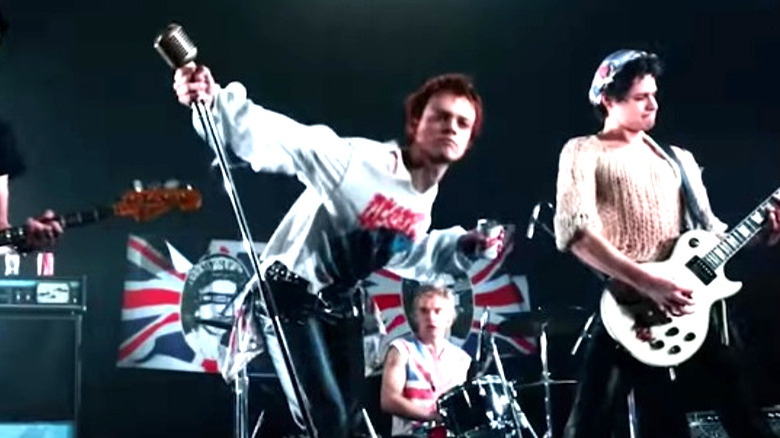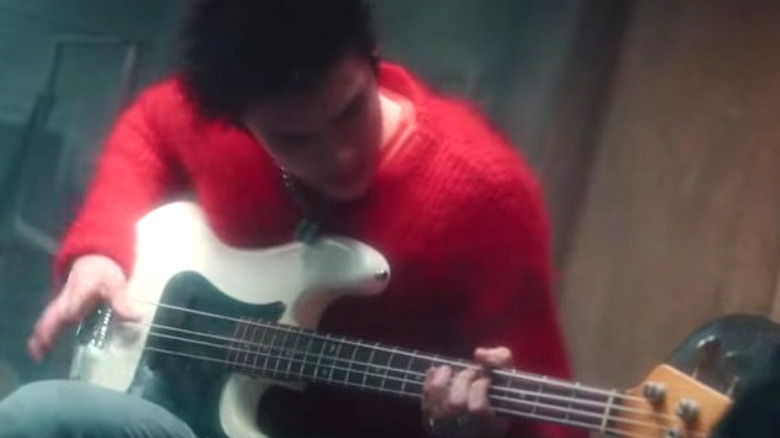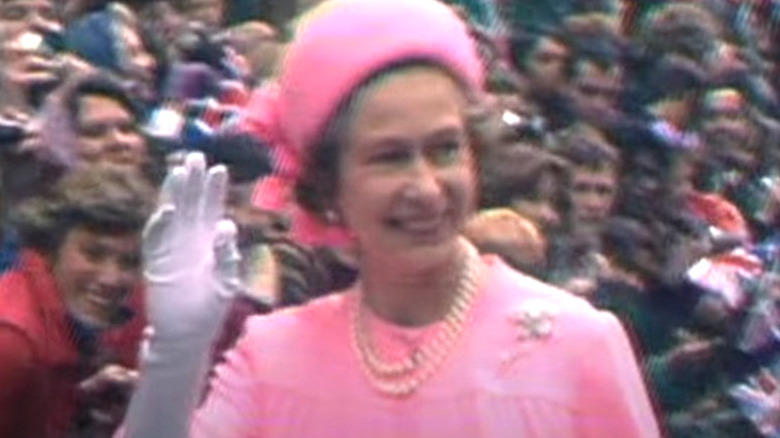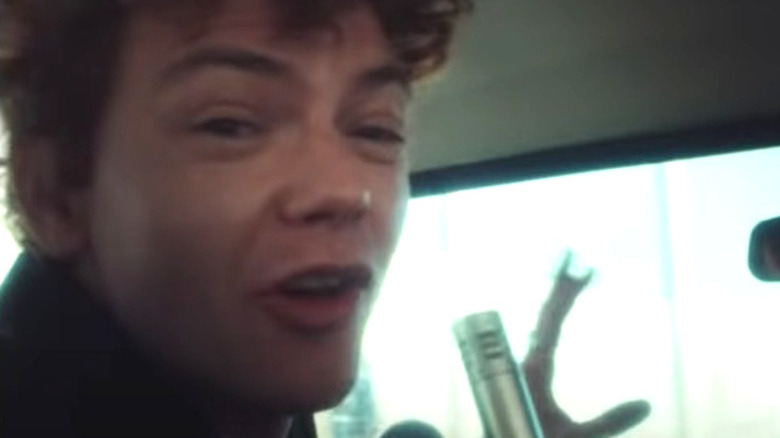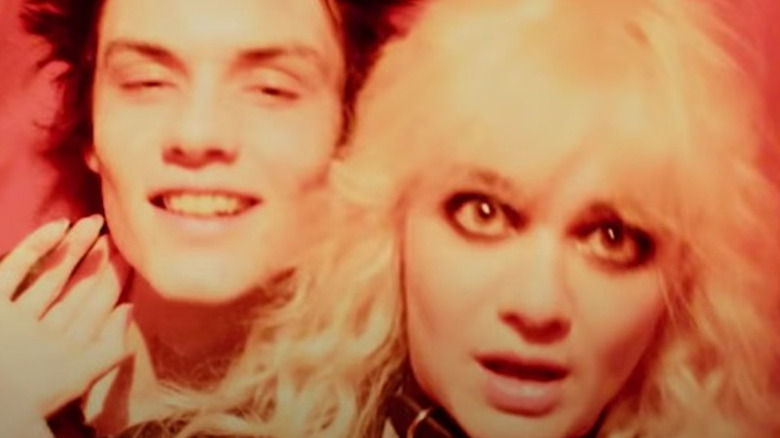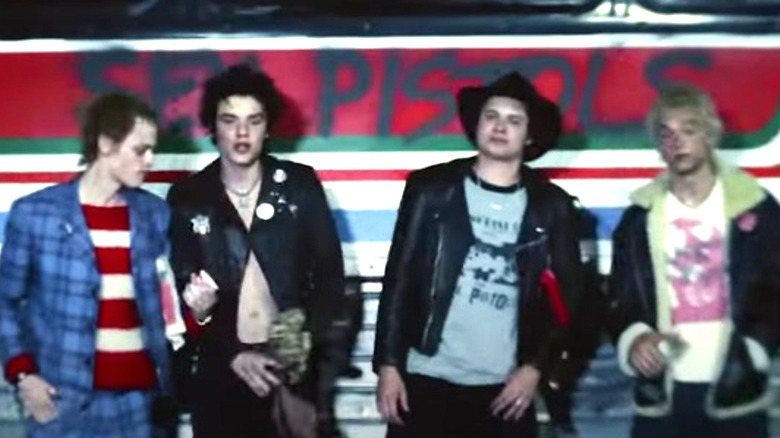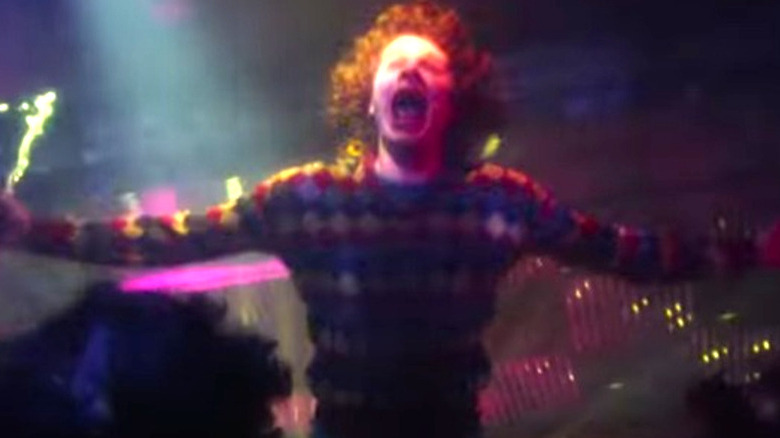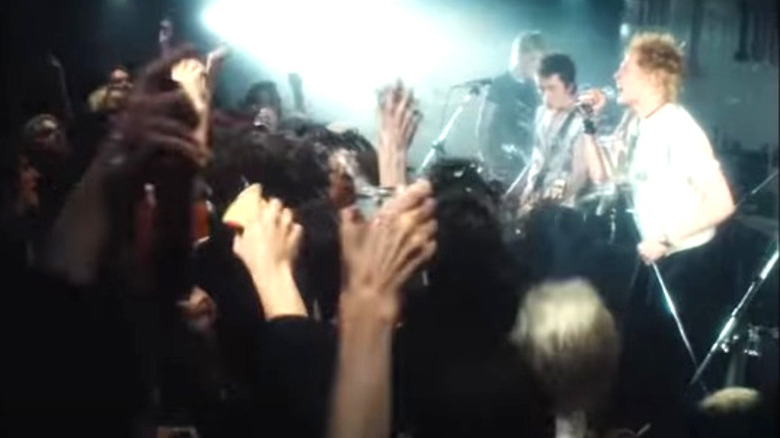The Ending Of FX's Pistol Explained
"Pistol" is director Danny Boyle's FX miniseries chronicling the swift rise and fall of UK punk band the Sex Pistols. Based on guitarist Steve Jones' memoir "Lonely Boy: Tales from a Sex Pistol," the show makes him the protagonist of the series. They could have easily gone with frontman Johnny Rotten or bassist Sid Vicious as their subject, but they've been featured elsewhere. By choosing to adapt Smith's book, the series lends itself a grounded sensibility that pairs nicely with elements of surrealism.
That being said, there's a ton packed into these six episodes. Jumping from typical biopic story beats to actual documentary footage and some surprising creative choices, it can be a dizzying experience. We're boiling down the show's themes and important story elements in an attempt to streamline everything in a clear and concise way. When we're done, you should have a better understanding of the major takeaways from "Pistol" — and an appreciation for the show's style as well as its substance.
Inspired by actual events
The series opens with a note over a black screen advising the viewer that the story is "inspired by actual events." The intention here is not to offer a completely accurate account of what happened; instead, the goal is to tell a story using real people who were involved with a real band that actually made music and toured and broke up. That's about it.
You can almost view the entire series as a form of historical fiction. Instead of a story examining a historic hypothetical like "what if Abraham Lincoln fought vampires?," they're sharing with us their own interpretation of events that actually took place. If you're a Sex Pistols aficionado ready to go off on the creators of this series for lying to people about the band, they've already assured you that a lot of the details here were made up.
One can be forgiven for being confused by this, however. The series is filmed in a grimy, blurry style that feels like documentary footage from 40 years ago. Scenes are also intercut with actual documentary footage revealing what was going on culturally in England at the time, making the fictional scenes feel even more genuine. Just remember the disclaimer and you should be able to accept the series as mythology rather than history.
Youth in revolt
The England we're shown throughout the series is one that has become stagnant. Documentary footage reveals the older generation appreciating safe, stale entertainment. From music to leisure activities, they're perfectly happy indulging in mindless distractions that don't challenge them in any capacity. While this is going on, young people are struggling to find their place. With few career prospects, they feel like society has moved on without them — and they're understandably furious about it.
They have no voice. No one is standing up and providing them with an outlet for their frustration. Enter the Sex Pistols: Noisy, dirty, and angry — exactly what their stuck-up society needs to shake off the dust and wake up. They couldn't really play their instruments or sing, but they had the right attitude and look to grab the attention of the disenfranchised.
That's the key to the series. Hate their music all you want, but their influence can't be denied. As pointed out by their manager Malcolm McLaren (played by Thomas Brodie-Sangster), rock music is essentially a young person's music, and the attitude and outrage filtered into the songs played by the Sex Pistols offered a rebellious call to arms to young people everywhere fed up with being ignored by the establishment.
Steve, Chrissie, and Bowie
In the middle of all this drab entertainment, there is David Bowie. The sparkly androgyny of his onstage personality is the closest thing the frustrated generation has to a visible rebellion. Bowie doesn't conform to social norms — he demands your attention and respect through his music and live performances. He is such an influence that young, broke Steve Jones steals a microphone smudged with the rocker's lipstick and treats it as a powerful totem.
Growing up with an abusive stepfather and a mother who never came to his defense, Jones was used to making his way through life unseen. So when future Pretenders bandleader Chrissie Hynde catches him stealing from the store where she works, he's surprised. The pair bond over a shared love of Bowie. They're drawn to and repelled by each other simultaneously.
No matter how excessive and chaotic things get in Jones' life, Chrissie remains stable. She sees him. She knows he's smarter and more talented than he thinks, and he knows she deserves much better than him. When they go their separate ways, it symbolizes the end of an era: Chrissie's band takes off and Jones' implodes. As devastating as it must've been for him, seeing Chrissie fulfill her potential while watching his own band dissolving might have saved his life.
Rotten in the UK
Steve Jones was supposed to be the lead singer of the band, but he wasn't comfortable having all eyes on him, so their manager made him the guitarist (even though he couldn't play) and brought in John Joseph Lydon to be the frontman. Of course, Johnny couldn't sing, but that didn't matter. Malcolm only cared about the image, and Johnny had the attitude he wanted.
Johnny's introduced in the series like the villain in a comic book movie. At the end of the first episode, he turns and looks into the camera with disdain and rage in his eyes. The message is clear: This is a dangerous man. While the other band members just want to play music, he wants to change minds. He wields his appearance and lyrics like a weapon, challenging the masses to look away while he spits in their faces.
Quickly asserting himself as the leader of the Sex Pistols, Johnny (dubbed Johnny Rotten) believes he should be in charge of the band's direction. Unlike Steve, he recognizes the way Malcolm is manipulating them. He's willing to go with it at first, but ends up putting his foot down. He gives Steve an ultimatum, threatening to quit unless they fire Malcolm. Steve's decision ushers in the end of the Sex Pistols.
All that matters is how you look
According to this series, the Sex Pistols were never really about the music. Perhaps they may have been at first, but once Malcolm became their manager, that all changed. As co-owner of a boutique specializing in provocative clothing, he understood the importance of how things look; prior to meeting Steve Jones, he was the manager of the New York Dolls. His vision was too bold for them, but he saw the Sex Pistols as a chance to really push the envelope.
He explicitly states that musicianship is not a requirement. All he cares about is shaping a band with something to say. Even more than that, he wants a band who will say what he wants them to say, so he manipulates Steve into slowly firing members who can play their instruments for ones who look the part. This is how Sid Vicious (born John Simon Ritchie) enters the fold.
Sid takes Malcolm's words to the extreme. He can't play bass and doesn't care. He knows he looks the part of a punk rocker, and he intends to milk that for all it's worth. When Johnny Rotten — his best friend — leaves the band, he doesn't care. With Rotten gone, Vicious is free to become the new face of the Sex Pistols, and that's what he wanted all along.
God save the queen
The band's first single is an ironic indictment of the monarch called "God Save the Queen." Originally, Johnny wants the song to be called "No Future," reflecting the way the song decries their generation's seeming lack of options. Malcolm, on the other hand, feels calling it "God Save the Queen" will be more provocative.
Rotten is upset by this, of course, because he wants to be clear with his message. He feels working people are being disenfranchised and wants the song's title to reflect that. After it's released as "God Save the Queen," they celebrate by listening to it with Johnny's parents; he finally accepts the title change because his mother approves of it.
Despite not getting any radio play, the single climbs up the charts. In a scene depicting the band and their friends gathered in a pub to hear themselves on the radio, they're initially crushed to find that the DJ has skipped it. However, if nothing else, this proves that despite various institutions trying to shield the public from their rebellious music, the intended audience is finding it.
Steve's father issues
As presented by the show, Steve Jones was abused by his stepfather — mentally, physically, and sexually. Terrified of what he might do to her if she spoke up, Steve's mother remained silent, and he never had anyone in his life who was willing to defend him. He made it through his teenage years by hiding beneath a metaphorical cloak of invisibility — all of which changed when Malcolm McLaren realized he could use him.
After being caught stealing, Steve was forced to stand trial. Just before sentencing was set to commence, McLaren stormed into the courtroom and defended Steve, claiming he was his employee and he would make sure he never broke the law again. That act of kindness, of putting his own neck on the line to save him, really meant something to Steve; from that moment on, he'd stick by Malcolm no matter what.
Even when everyone else can see that Malcolm is withholding information about the band's finances and making rash decisions like working in a dirty rehearsal space, touring American bars, and being interviewed on the BBC are tactical decisions meant to keep them angry, Steve remains loyal. It isn't until Malcolm chastises him and reminds him that he isn's his father that Steve's eyes finally open — but by that point, it's too late.
The tragedy of Sid and Nancy
Sid Vicious doesn't have Johnny Rotten's political motivations, and he doesn't care about music. His main driving force is appearing cool. He does this through his clothing and hairstyle while drinking heavily and starting fights. As is stated late the series, Sid's happiest when he's getting beaten up.
Things go from bad to worse when he meets Nancy Spungen, an American woman with the rock 'n' roll life experience he's been craving. She also happens to be addicted to heroin, and their relationship is beyond toxic. Sid's own addiction is only exacerbated by Nancy's presence; they feed off each other's negative energy to the point of grave codependency.
Even if you don't already know the real-life story, it's obvious how this will end. Two beings this destructive cannot exist in the same space without damaging each other irrevocably. Although Sid seems to really love Nancy with all his heart, the drug that binds them together is the cause of their tragedy. Sid wakes up to find Nancy dead, stabbed in the abdomen. Did he do it? The show never tells us. Before he can go to trial, he overdoses. It's a sobering moment that lifts the haze from the band.
Welcome to America
When the popularity of the Sex Pistols starts skyrocketing, Malcolm decides it would be a good idea to have them tour America, booking them in dive bars in the southern states. Many of those in attendance are clad in leather and appear as though they might like a bit of aggression in their music, but most of them hate the band and throw objects at them.
Soaked in beer and blood, the band seethes at the experience. Johnny has reached his breaking point. He knows they should be a bigger band, but Steve's devotion to Malcolm makes that impossible. This is where Johnny finally tells Steve that he needs to fire Malcolm or he walks. Steve meets with Sid to discuss, but the two end up getting high instead. Steve finds he enjoys heroin and picks up the habit.
The band sits down with Malcolm and Steve informs Johnny that he needs to leave the lineup. Shocked, Johnny assumes Sid is leaving with him, but Malcolm has announced plans to put them in a movie and make Sid the new face of the Sex Pistols. Even though he hates Malcolm for convincing everyone else to send Nancy back to America (albeit temporarily), Sid stays with the band, excited for the fame and notoriety coming his way.
You'll go the same way Sid did
When the dust settles, Steve finds himself lost once again — and now he has a heroin habit to boot. Johnny comes to visit him, feeling guilty about what happened to his friend Sid. More than once, Rotten says Sid was his only true friend; losing him hit Johnny especially hard. Johnny wanted Sid to be part of the band. In his mind, he needed Sid there to keep him in check, focused on his revolutionary mission.
Johnny tells Steve to kick the heroin or he'll go out the way Sid did. Perhaps this is Johnny's attempt at correcting his own behavior, speaking up when a friend is in trouble, but Steve tells him Sid would've died whether or not he was a Sex Pistol. His addiction was too deeply rooted and his lifestyle was too destructive. For the first time, Johnny and Steve see each other as equals.
Before leaving, Johnny acknowledges that the two of them achieved something special and predicts people will remember them. Up until now, they've both been wrestling for control of the Sex Pistols — Steve seeing himself as the leader, while Johnny's positive that he's the one driving things. In the reality depicted by "Pistol," they're both leaders, and anything the band achieved came because they worked together.
Only 'cos it's Christmas
The final scene is a flashback to a Christmas benefit concert the band played to support striking firemen and their families. The band is perfectly in sync and actually using their music to help people — Johnny especially goes out of his way to make sure that the children of these working-class heroes have a good time. It's a brief glimpse of what might've been if the band had stopped fighting.
During this segment, we also see footage of Queen Elizabeth's silver jubilee. As England celebrates the monarchy, the Sex Pistols are actively helping taxpayers. The final shot sees the city shooting off fireworks (all of which spell a rude word commenting on the jubilee) while one building is packed to the brim with young people having a great time. That's what the series is all about.
The Sex Pistols may have been combative and confrontational, but they gave young people a voice — and an outlet for their frustration — at a moment when it seemed like the rest of the world was ignoring them.
